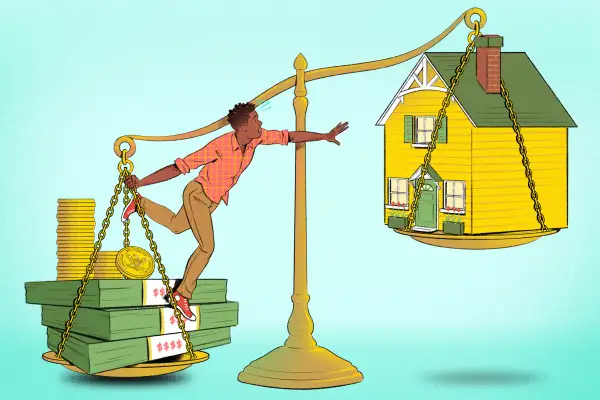5 Tips for Buying a House When Inflation Is High

Americans haven’t seen inflation this high since shoulder pads were in, Ronald Reagan was president and the first Indiana Jones was still playing on the big screen.
The latest consumer price index reading clocked in at 8.5%, the highest rate of price growth since December 1981. People are feeling pinched at the grocery store, where the cost of meat, poultry, fish and eggs is up nearly 14% compared to last March. And at the gas pump, a gallon of unleaded is now topping $5 in some cities.
In the housing market, where skyrocketing prices and rents were already a problem, hopeful homeowners are feeling the burn even more. Home prices jumped 19% between January 2021 and January 2022. In March, the median price for active home listings was $405,000 — the highest point on record, according to Realtor.com.
Inflation is only adding fuel to this fire, causing both prices and mortgage rates to rise further — a “double whammy,” as Francis Creighton, president of the credit reporting trade association Consumer Data Industry Association, puts it. “Their dollars have less buying power and loans get more expensive,” he says.
Unfortunately, experts predict inflation will remain high as the year goes on. Are you hoping to buy a home despite these headwinds? Here’s what inflation will mean for your goals — and how to cushion its blow.
How inflation impacts home prices
Historically, when inflation rises, so do house prices. This is in part because inflation makes home construction more expensive, which increases the prices of new homes and discourages building.
“This benefits sellers. However, it creates a much more challenging environment for buyers,” says Noble Black, a real estate agent with Douglas Elliman in New York.
Builders are already showing signs of slowing down. According to the National Association of Home Builders, builder confidence has dropped to its lowest point since September 2021. Building permits — a good indicator of future construction activity — also dropped 2% from January to February, according to Census Bureau's latest numbers.
Prices on newly built homes have also risen quite a bit since inflation started creeping upward. The median sale price of a new home was $400,600 in February. In December, it was just $377,000.
How inflation impacts mortgage rates
Meanwhile, as the Federal Reserve tightens monetary policy to fight inflation, mortgage rates are spiking. The average rate on 30-year mortgages has jumped considerably since the Fed started signaling its intention to raise short-term interest rates, jumping from 3.11% at the start of the year to 5% as of mid-April.
“Inflation is one of those factors contributing to higher mortgage rates, in part, because investors are pricing in a bit of an inflation premium,” says Danielle Hale, chief economist at Realtor.com. “If money's going to be worth less in the future, when people are paying back those mortgages, they're going to want a higher interest rate upfront.”
Over time, this one-two punch of rising rates and rising prices will decrease overall housing affordability and make purchasing a home even more challenging — particularly for those with tight budgets.
“The problem is that the increase in mortgage rates means that if you want to keep your payment the same, you now can afford a lower-priced home,” says Jay Zigmont, a certified financial planner and founder of wealth planning firm Live, Learn, Plan.
Tips for buying a house in the face of inflation
To be clear: It’s not impossible to buy a house in a high-inflation market, but it is challenging — and often costly. Though there's no way to avoid inflation's influence entirely, industry pros say some strategies can help you mitigate its impact.
If you’re hoping to buy a home this year despite inflation, here’s what you can do:
1. Buy a house ASAP
With more Fed rate hikes and higher prices on the horizon, experts say time is of the essence for buyers — at least if they want to avoid further hits to affordability.
“Rising inflation means that cash now holds more value than it will in the future, assuming inflation continues to rise,” says Rob Heck, vice president of mortgage at Morty, a mortgage loan marketplace. “It could be cheaper to buy right now than in the future, especially if home prices continue their upward climb.”
Put simply: If you buy now, you lock in a price and mortgage payment in today’s dollars — not the less valuable dollars of the future.
Buying soon can also help consumers avoid skyrocketing rent prices, which are rising faster than home prices in many places. According to Realtor.com, the median asking rent last month was up 17% compared to March 2021.
“If you buy now, you’ll have the chance to benefit from the inflation of home prices,” says Maggie Gomez, a certified financial planner and founder of Money with Maggie, which provides financial and investment advisory services. “Rent prices are increasing right alongside home prices, so you may not be saving much by waiting to buy if you end up spending a lot of time paying someone else's mortgage at inflated costs.”
2. Adjust your house budget — and factor in other higher costs too
Lindsey Bell, chief markets and money strategist at Ally, recommends determining your absolute cap — the maximum you can spend on your monthly mortgage payment — and working backward from there.
“Buyers should take a hard look at their overall budget and determine what their final home price is,” Bell says. “Basically, they need to understand when it’s time to walk away.”
If you plan to spend more than before, you’ll also want to factor in bigger down payment (20% of a $400,000 house is a lot more than 20% of a $350,000 one), higher costs of living and the rising prices of ancillary goods and services — like those associated with your move and home maintenance and repairs.
As Dennis Duban, a CPA and founder of DLD Accountancy, explains, “Movers, remodeling costs, utilities, property taxes and insurance will all increase, so buyers should be aware of these costs as well when doing a budget.”
3. Expand your home search
Once you adjust your budget, you may also want to reassess your house-hunting strategy. That might mean looking at smaller properties or townhomes, searching in more rural, less in-demand areas or just shopping in lower price ranges.
If you opt for the latter choice, proceed with caution — particularly if you’re eyeing a fixer-upper. As with everything, the price of building materials and labor are rising, so repairing or renovating a property will cost you more than before, too.
“The materials needed to renovate a home will likely be more expensive and take longer to arrive than expected,” says Steven Gottlieb, a real estate agent with Coldwell Banker Warburg in New York. “Buyers need to plan accordingly, even if taking on a minor facelift in the new home.”
4. Improve your credit score and financial picture
In a higher-cost environment, qualifying for the lowest interest rates possible will help keep monthly costs to a minimum. To do this, though, you’ll need a high credit score — usually a 740 or higher, depending on your lender.
“Keeping your credit score as high as possible will get you the best mortgage rate, and that will keep your payment down,” Duban says.
To raise your score, you can pay down your debts, avoid late payments and fix any errors on your credit report. Reducing your credit card balances or asking for a higher credit limit can also help.
You may want to bring a bigger down payment to the table, too. This lessens the risk for the lender, and they may reward you with a lower interest rate. It also protects you in case home prices decline over time.
“A higher down payment acts as a better hedge against declines in real estate values,” Bell says. “The more put down, the lower the chances that a slight dip in the market will put buyers in a position where they owe more than what their future home is worth.”
5. Think beyond a 30-year fixed-rate mortgage
Finally, if you’re looking to reduce costs in the face of inflation, it’s important to choose your mortgage loan carefully. As Heck explains, “There are a lot of different options available that could work well for you as a buyer and putting 20% down and getting a 30-year mortgage is not always the best fit.”
An adjustable-rate mortgage (ARM) may be a better option for some buyers. These have lower rates for the first few years of the loan term — typically three, five, or seven years — and the rate can adjust after that. These may be smart for buyers who know they won't stay in the home long.
“An ARM allows a buyer to lock in at a lower than average mortgage rate for a set term,” says Kimberly Jay, a real estate agent with Compass in New York. “This can save a buyer money if they don’t plan on living in the home for a long period of time.”
There are also loans that come with low down payment requirements and no mortgage insurance costs, which may also soften the blow of inflation for qualifying buyers. Before you begin your home search, talk to a loan officer or mortgage broker about what loan programs you may be eligible for, and be sure to shop around. Rates and terms can vary significantly from one mortgage company to the next.
More from Money:
'I Wouldn’t Freak Out Yet.' 6 Tips for Buying a House When Mortgage Rates Are Rising
Spring Home Buying Guide: Will the Hot Housing Market Finally Chill Out?


